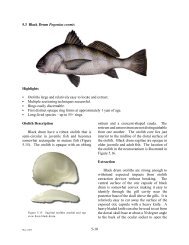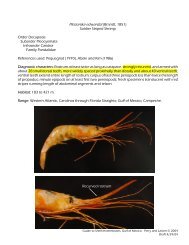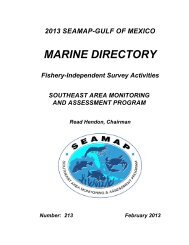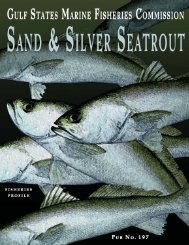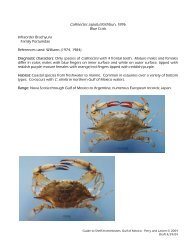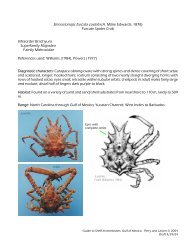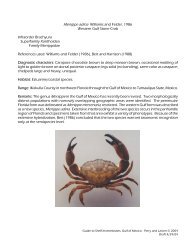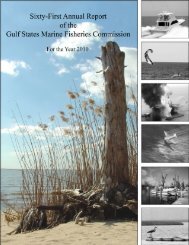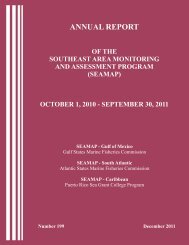Basic Commercial Fishing Regulations - Gulf States Marine ...
Basic Commercial Fishing Regulations - Gulf States Marine ...
Basic Commercial Fishing Regulations - Gulf States Marine ...
Create successful ePaper yourself
Turn your PDF publications into a flip-book with our unique Google optimized e-Paper software.
Vessels licensed under Section 49-15-46 may keep in whole, for personal consumption up to thirty-six (36) blue crabs<br />
(portunidae family), per day. This exemption for personal consumption does not apply to fish or crabs that are otherwise<br />
illegal to possess or catch.<br />
Unless otherwise authorized under this section, any boat or vessel which catches or takes oysters by means of dredges, drags,<br />
or scoops (other than hand tongs) from any of the areas described in this section or with a dredge or dredges in the water shall<br />
have all oysters onboard the boat or vessel declared to be contraband. The oysters shall be taken and confiscated by the<br />
MDMR or marine law enforcement officer without court procedure. The captain and crew of the boat or vessel, promptly<br />
upon being ordered to do so, shall transport the oysters to a point on the public reefs of the state where the boat or vessel is<br />
found and there scatter the oysters according to the instructions of the enforcement officers. Any person who violates this<br />
section shall be punished as provided in §49-15-63.<br />
Size Limits<br />
Oysters taken in state waters must be at least three inches (3”) long from hinge to bill. At times, however, the MDMR may<br />
adjust this limit upon public notice to that effect.<br />
Limits<br />
Recreational and commercial catch limits are set annually (set by Mississippi State Statute 97-15-29).<br />
Leases<br />
The MCMR conducts a program of oyster leasing. Any resident of the state may lease state water bottoms for the purpose of<br />
oyster culture. Oysters taken from private lease areas must be so designated by tags indicating the official leased number<br />
issued by the MDMR.<br />
Shell Retention Fee<br />
The MCMR shall assess and collect a shell retention fee for the shells taken from waters within the territorial jurisdiction of<br />
the state of Mississippi as follows.<br />
<strong>Commercial</strong> and recreational harvesters – fifteen cents (15¢) per sack paid to the MDMR on the day of harvest;<br />
Initial oyster processor, dealer, or factory first purchasing the oysters – fifteen cents (15¢) per sack paid to the MDMR no<br />
later than the tenth day of the month following the purchase on forms submitted by the MDMR;<br />
<strong>Commercial</strong> harvesters transporting their catch out of state – fifty cents (50¢) per sack paid to the MDMR on the day of<br />
harvest.<br />
Funds received from the shell retention fee shall be paid into a special fund in the state treasury to be appointed by the<br />
Legislature for use by the MCMR to further oyster production in this state, which includes “planting” oysters and/or cultch<br />
materials.<br />
Restrictions<br />
Both recreational and commercial harvesters must purchase a license from the MDMR. Oysters may be taken only from<br />
those waters approved for shellfish harvest by the MDMR. The harvesting, shucking, processing, and sale of oysters must<br />
also conform to all regulations specified by the MDMR.<br />
Following heavy rains, natural reefs and leased areas may be temporarily closed. Closures are published in local newspapers<br />
and released to local television and radio media.<br />
Oysters taken from state waters must be tagged. These tags are issued by the MDMR at officially designated check-in/checkout<br />
stations. These stations will be identified in the opening order for oyster season. Both commercial and recreational<br />
oystermen must check-in at the designated check station before going to reefs and must check-out at the same station.<br />
Station hours are from 7:00 a.m. until 4:00 p.m. during harvest. Tags are issued at the time of inspection. Each tag must be<br />
completed with the catcher’s name, date caught, area caught, and shell-stock dealer’s name and identification number if the<br />
oysters are to be sold. The MDMR shall number all tags issued and shall maintain a record of those tags. The MCMR, at its<br />
discretion, may adopt any regulations regarding the tagging of oysters and other shellfish. Oysters taken from other than<br />
state waters must be accompanied by a bill of lading indicating the point of origin. Oysters taken for personal consumption<br />
must also be inspected, and a tag will be issued for each sack. Such tags will identify that the contents are not to be sold.<br />
140




